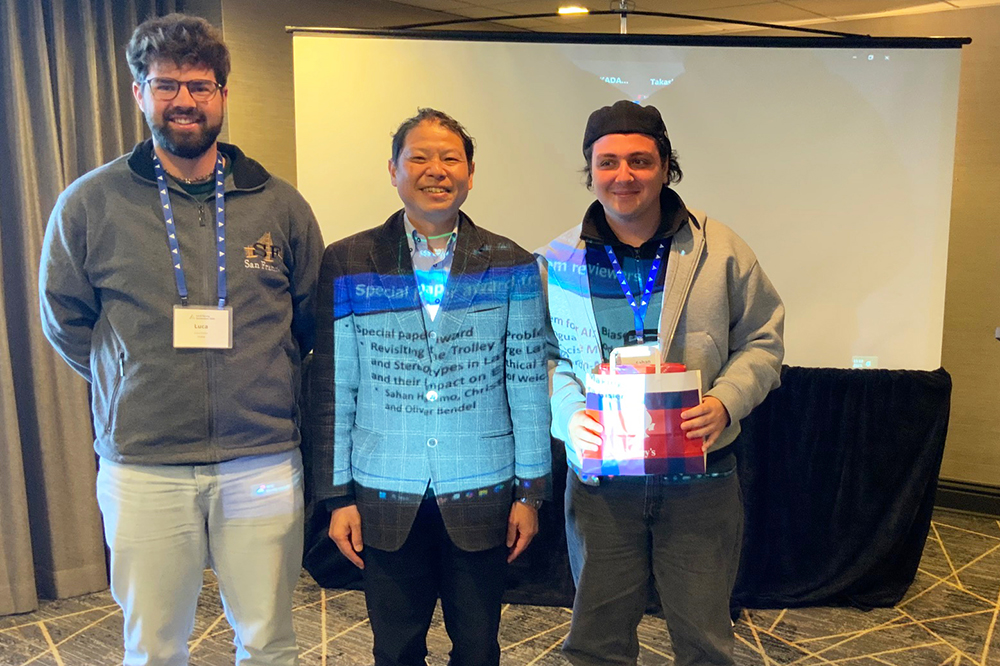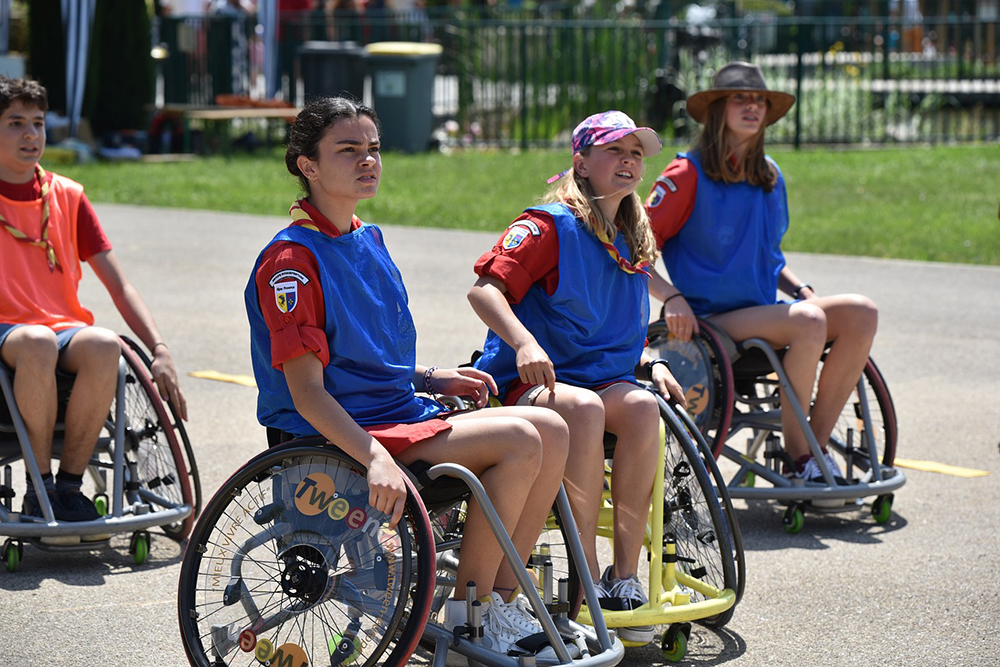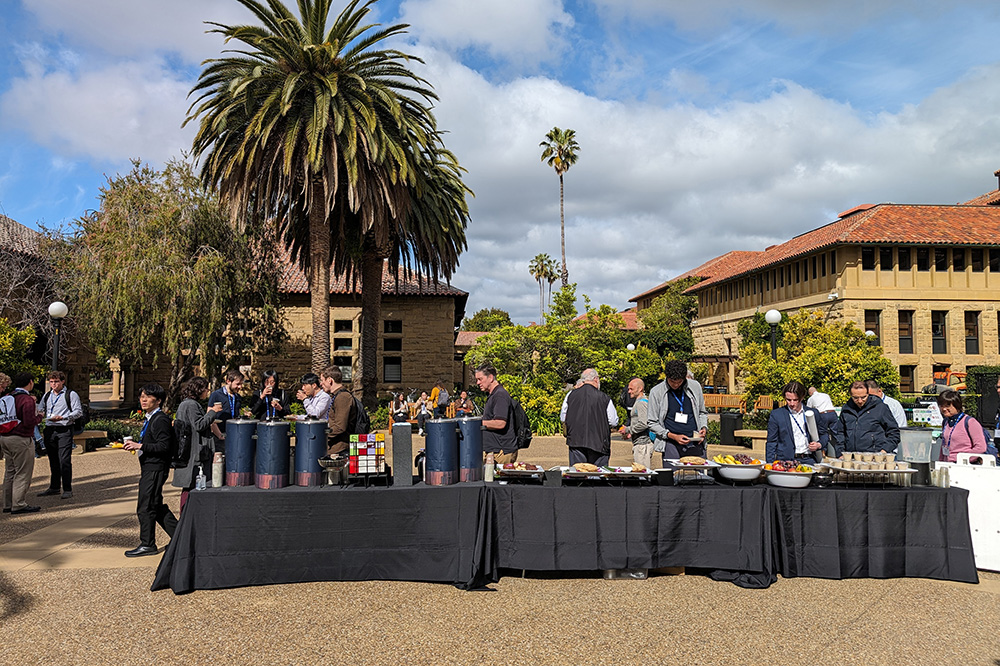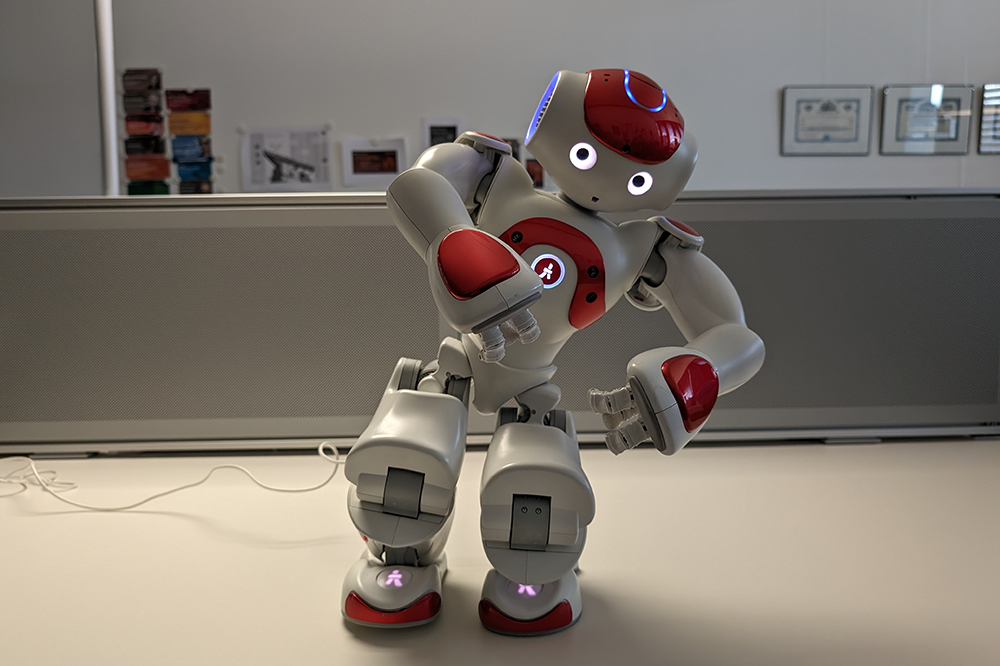The paper “Revisiting the Trolley Problem for AI: Biases and Stereotypes in Large Language Models and their Impact on Ethical Decision-Making” by Şahan Hatemo, Christof Weickhardt, Luca Gisler, and Oliver Bendel received the Special Paper Award from the reviewers of the AAAI 2025 Spring Symposium “Human-Compatible AI for Well-being: Harnessing Potential of GenAI for AI-Powered Science”. The three bachelor students from the FHNW School of Computer Science gave their presentation on site in San Francisco as part of the AAAI 2025 Spring Symposia. Prof. Dr. Bendel from the FHNW School of Business had given them feedback on the project and placed it in the context of machine ethics. He has been involved in the well-known and popular conference, which usually takes place at Stanford University, since 2016. This time, he was keeping his fingers crossed from Italy. The proceedings of the AAAI 2025 Spring Symposia will be published shortly.
Sponsorship for the ICSR 2025
Join us as a sponsor for the 17th International Conference on Social Robotics & AI, taking place on 10-12 September 2025 at Naples, Italy. This prestigious event brings together researchers, leading experts, innovators, and thought leaders in the fields of robotics, AI, and human-robot interaction. Don’t miss the opportunity to align your brand with cutting-edge advancements. We offer different sponsorship/exhibition packages, all information is available at the page: icsr2025.eu/sponsor2/. If you are interested or have any questions, don’t hesitate to contact us at info@icsr2025.eu with the subject line tag [Sponsorship]. The ICSR is one of the leading conferences for social robotics worldwide. Participants will meet for two days at the Parthenope University of Naples and for the third day at the Città della Scienza conference center. More information on icsr2025.eu.
About Inclusive AI
The Gabler Wirtschaftslexikon is the largest economics encyclopedia in the German-speaking world. In March 2025, Oliver Bendel published an article on inclusive AI in this reference work. The first part reads as follows: “Inclusive AI aims, on the one hand, to combat phenomena in artificial intelligence (AI) that have an exclusionary character – such as bias, hallucination, hate speech, and deepfakes – and, on the other hand, to strengthen applications with an inclusionary character in order to support those affected. One meaning is associated with terms like “responsible AI”, “explainable AI”, and “trustworthy AI”, while the other aligns with concepts such as “AI for good” or “AI for wellbeing”. Overall, this falls under the umbrella of “ethical AI”, though this term is also used in marketing contexts. In 2025, the World Economic Forum (WEF) pointed to the digital divide, asking: “How do we ensure that the growth of AI doesn’t leave people behind and is truly inclusive?” Inclusive AI can be associated with generative AI as well as with other forms of artificial intelligence.” The full article is available at:
wirtschaftslexikon.gabler.de/definition/inclusive-ai-171870.
A Video About the ICSR 2023
ICSR is one of the leading conferences for social robotics worldwide. The 17th edition will take place from 10 to 12 September 2025 in Naples, Italy. Participants will meet for two days at the Parthenope University of Naples and for the third day at the Città della Scienza conference center. In 2023, the conference took place in Doha, Qatar. A video on YouTube by Hooman Samani provides insights into the presentations and events: www.youtube.com/watch?v=MtgM8pTPw8c … It not only shows that numerous top-class presentations take place, but also that the members of the community are highly motivated and have a lot of fun. The high level of internationality and diversity of the conference should also be emphasized. The conference website of ICSR 2025 is online since January: icsr2025.eu.
Human Stuff from AI Characters
“Left to their own devices, an army of AI characters didn’t just survive – they thrived. They developed in-game jobs, shared memes, voted on tax reforms and even spread a religion.” (MIT Technology Review, 27 November 2024) This was reported by MIT Technology Review in an article on November 27. “The experiment played out on the open-world gaming platform Minecraft, where up to 1000 software agents at a time used large language models (LLMs) to interact with one another. Given just a nudge through text prompting, they developed a remarkable range of personality traits, preferences and specialist roles, with no further inputs from their human creators.” (MIT Technology Review, 27 November 2024) According to the magazine, the work by AI startup Altera is part of a broader field that seeks to use simulated agents to model how human groups would react to new economic policies or other interventions. The article entitled “These AI Minecraft characters did weirdly human stuff all on their own” can be accessed here.
Grandma Daisy Tricks Phone Scammers
“Human-like AIs have brought plenty of justifiable concerns about their ability to replace human workers, but a company is turning the tech against one of humanity’s biggest scourges: phone scammers. The AI imitates the criminals’ most popular target, a senior citizen, who keeps the fraudsters on the phone as long as possible in conversations that go nowhere, à la Grandpa Simpson.” (Techspot, 14 November 2024) This is reported by Techspot in an article from November 14, 2024. In this case, an AI grandmother is sicced on the fraudsters. “The creation of O2, the UK’s largest mobile network operator, Daisy, or dAIsy, is an AI created to trick scammers into thinking they are talking to a real grandmother who likes to ramble. If and when the AI does hand over the demanded bank details, it reads out fake numbers and names.” (Techspot, 14 November 2024) Daisy works by listening to a caller and transcribing his or her voice to text. Responses are generated by a large language model (LLM), complete with character personality layer, and then fed back through a custom AI text-to-speech model to generate a voice response. All this happens in real time, as the magazine reports. As phone scammers use more and more AI in their calls, you will soon find AI systems trying to outsmart each other.
Tinder’s AI Photo Selector
Tinder has officially launched its “Photo Selector” feature, which uses AI to help users choose the best photos for their dating profiles. This was reported by TechCrunch in the article “Tinder’s AI Photo Selector automatically picks the best photos for your dating profile” by Lauren Forristal. The feature, now available to all users in the U.S. and set to roll out internationally later this summer, leverages facial detection technology. Users upload a selfie, and the AI creates a unique facial geometry to identify their face and select photos from their camera roll. The feature curates a collection of 10 selfies it believes will perform well based on Tinder’s insights on good profile images, focusing on aspects like lighting and composition. Tinder’s AI is trained on a diverse dataset to ensure inclusivity and accuracy, aligning with the company’s Diversity, Equity, and Inclusion (DEI) standards. It also filters out photos that violate guidelines, such as nudes. The goal is to save users time and reduce uncertainty when choosing profile pictures. A recent Tinder survey revealed that 68% of participants found an AI photo selection feature helpful, and 52% had trouble selecting profile images. The TechCrunch article was published on 17 July 2024 and is available at techcrunch.com/2024/07/17/tinder-ai-photo-selection-feature-launches/.
Miss AI 2024
According to the organizers, the World AI Creator Awards (WAICA) is a first-of-its-kind global awards program dedicated to recognizing the achievements of AI creators around the world. The first installment of the WAICAs was Miss AI – where traditional beauty pageants intersected with the world of AI creators. Contestants were judged on their beauty, technical implementation, and social impact. The winners of Miss AI 2024 are Kenza Layli (Morocco), Lalina (France), and Olivia C (Portugal). They are already successful on Instagram, showing themselves in different poses and clothes. The beauty pageant attracts worldwide attention, but is also criticized. One statement is that women are being turned into objects, no different from the classical variants. Another observation is that the first place could strengthen religious conservatism – because Kenza Layli is an artificial woman who covers her virtual hair with a digital hijab (Image: Ideogram).
The AAAI Spring Symposia are Back Again
On the second day of the AAAI Spring Symposia, one could already get the impression that the traditional conference has returned to its former greatness. The Covid pandemic had damaged it. In 2023, there were still too few participants for some symposia. Many stayed home and watched the sessions online. It was difficult for everyone involved. But the problems had already started in 2019. At that time, the Association for the Advancement of Artificial Intelligence had decided not to publish the proceedings centrally any more, but to leave it to the individual organizers. Some of them were negligent or disinterested and left the scientists alone with their demands. In 2024, the association took over the publication process again, which led to very positive reactions in the community. Last but not least, of course, the boost from generative AI helped. In 2024, you can see many happy and exuberant AI experts at Stanford University, with mild temperatures and lots of sunshine.
25 Artifacts and Concepts of ME and SR
Since 2012, on the initiative of Oliver Bendel, 25 concepts and artifacts of machine ethics and social robotics have been created to illustrate an idea or make its implementation clear. These include conversational agents such as GOODBOT, LIEBOT, BESTBOT, and SPACE THEA, which have been presented at conferences, in journals and in the media, and animal-friendly machines such as LADYBIRD and HAPPY HEDGEHOG, which have been covered in books such as “Die Grundfragen der Maschinenethik” by Catrin Misselhorn and on Indian, Chinese and American platforms. Most recently, two chatbots were created for a dead and an endangered language, namely @ve (for Latin) and @llegra (for Vallader, an idiom of Rhaeto-Romanic). The CAIBOT project will be continued in 2024. In this project, a language model is to be transformed into a moral machine with the help of prompt engineering or fine-tuning, following the example of Claude von Anthropic. In the “The Animal Whisperer” project, an app is to be developed that understands the body language of selected animals and also assesses their environment with the aim of providing advice on how to treat them. In the field of machine ethics, Oliver Bendel and his changing teams are probably among the most active groups worldwide.









